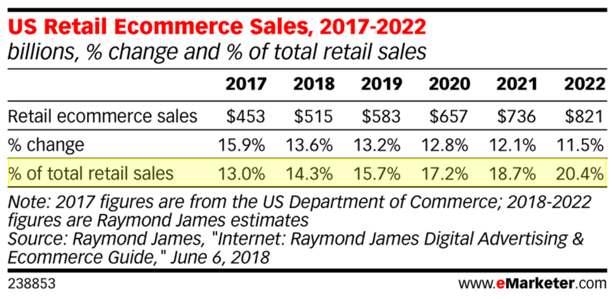Over the past 11 years, social commerce has grown tremendously. If you're unaware, social commerce is when people discover a product on a social network and then buy it online.
The Current Social Commerce Landscape
Recent studies have revealed that 30 percent of all U.S. internet users said they've purchased something they've first found on a social network. And 50 percent of Generation Z users say they actively use social networks as a way to research products. As you can see in the chart below, this measurement goes down a bit as the users' age increases. It's about 24 percent for people above 55, but this shows how younger people are really adapting to this new reality and using these social networks as a way to determine what they end up buying.

The social networks are certainly responding to this growing phenomenon. Instagram's making their ads much more shoppable. Facebook's pushing people to click-to-buy ads and rolling out new augmented reality ads. And now, discovered this week by TechCrunch, there's code hidden in the Snapchat platform for a program they're testing where you will be able to take a picture of something in Snapchat and then find it to buy on Amazon.com. This is a potentially huge way for Snapchat to get into the e-commerce business, which is important for Snapchat because they're not making much money off of their ad platform right now.
However, many social platforms missed the mark on social commerce in its early days. Remember Facebook Gifts, when you could buy a gift on Facebook? They were getting our credit card information, they had our home address, and more, but they tried to take 30 percent of all the value of gifts. That means you could only really afford to sell on Facebook if you were selling a virtual gift that had really no cost to manufacture. Anyone selling something tangible couldn't afford to pay 30 percent to Facebook. If they had taken a model much more like Visa or Mastercard, where they take two or three percent of the transaction, Facebook and Instagram could be making billions right now.
Pinterest also made a big mistake way back when they used to put affiliate links in all of the links out to buy, where Pinterest itself would make money from sales but they didn't tell anyone they were doing it. So, when that news broke there was a bit of a scandal and Pinterest stopped doing affiliate links to all these brand sites. It could have been making them a fortune right now if they had handled that better.
How Will Influencers Benefit from Social Commerce?
Simply put, many of them already are. Those using LIKEtoKNOW.iT have already helped facilitate one billion dollars in e-commerce sales, gaining affiliate commissions from much of that. So it's a good way for influencers that already make money is using some of these affiliate links and these affiliate systems to supplement the money they get from their more traditional sponsored posts.
Another key concept to note is that this industry is growing really quickly. In the United States, we'll expect to see about a thirteen percent increase in sales every year for the next four or five years until about one in every five dollars spent at all is being spent online. Meanwhile, you have Facebook and Instagram and others under pressure for their data and privacy issues from Cambridge Analytica, which is how they make their money from ads. A wise Facebook team will want to diversify their revenue away from just ads into social commerce and get a piece of this huge growing multibillion-dollar industry. If that happens, they'll be wise to take a page from YouTube and share that revenue with the people delivering the traffic, which would be in many cases the influencers.

Ultimately, there are going to be heavy changes in social commerce over the next 24 months, and influencers are going to play a big part in that. And the social platforms are very likely to make serious systemic changes to help them get a piece of this revenue pile.
If you're working to figure out how social commerce plays into your influencer marketing strategy, contact us today and we'll help you develop the perfect strategy.
.png?width=504&height=360&name=Carusele%20logo%20%C2%AE%20logo%20Color%20(2).png)